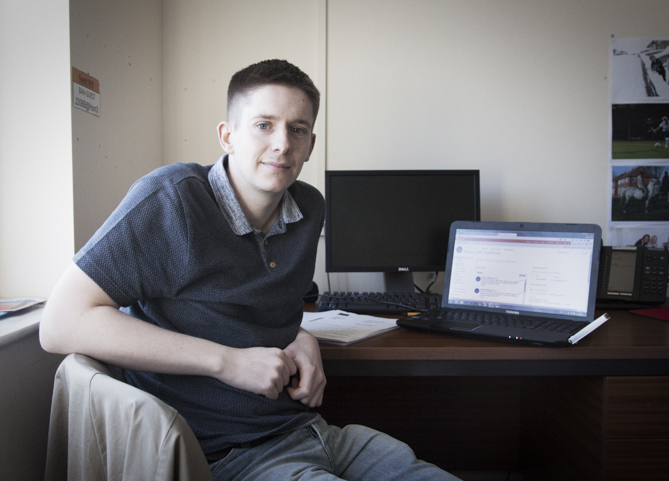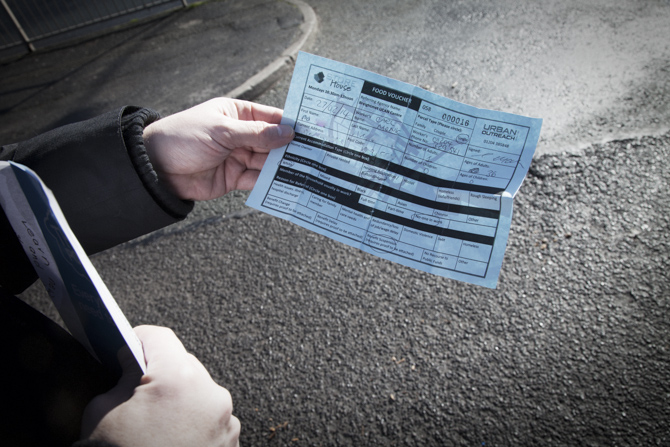John is looking out for me from his living room window. This is a big day for him. A day that could significantly change the rest of his life.
I introduce myself on his doorstep. His handshake suggests a lifetime of manual work although I know this isn’t how it’s panned out.
“Sorry, I don’t know the way,” I say as we settle into my car.
“Straight to the end and turn right,” he says.
By the time we’ve reached the T-junction I’ve determined that John is 49, moved from Heywood to Breighmet two years ago and has a one-year-old daughter with his new partner.
“And four kids from my previous relationship,” he tells me.
“So you’re doing it all again. How does that feel?” I ask, recalling all that sleep deprivation.
“It keeps you young,” he replies.
John has been attending the little pilot course that Mike has been running at the UCAN. It’s for people who have been on Incapacity Benefit and have now found themselves re-assessed and on Jobseekers’ Allowance.
“One day I was telling him how self conscious I feel about my teeth. Next left. The next minute he was making an appointment for me at this dentist. That was two weeks ago.”

“And what happened at that first appointment?”
“I was sent for an X-ray at the hospital. I went back on the Wednesday and he took half of them out right then. I went again on the Thursday and he took the other half out.”
I wince. “How many did he take out each time?”
“About ten.”
“Ten in one go, and then another ten?”
“Yeah.”
“Oh my god. What was that like? It must have been traumatic. Right or left here?”
“Left. When I came out of the dentist I felt someone had hit me in the face with a bat. And the next day it felt like someone had hit the other side,” John jokes. “But on the good side, I’ve lost over half a stone because I can’t eat anything.”
Perhaps to give John a fighting chance until his dentures are ready, the dentist has left a couple of yellow pegs in his bottom jaw. “So what have you been eating in the meantime?”
“Soup.”
“If you don’t mind John, tell me about being on Incapacity Benefit.”
“I was on the sick for a while because I used to have quite a bad alcohol problem. I sorted that out but, because I’d stopped drinking, I ended up with an amphetamine problem.
“Then five years ago my wife left me and I had my eldest daughter living with me. I decided then that I needed to sort my life out and haven’t touched anything since.”
“So your teeth wouldn’t have been a priority in those times when you were alcohol and drug dependent?”
“No, no. I kept putting it off but it really affected me. I couldn’t clean my teeth because the gums would bleed the whole time and so I had bad breath. I’d always hold my hand over my face and was really worried people were looking at my teeth. They were a mess. Turn right at the lights.”
“So this is part of a process of sorting yourself out?”
“I think my confidence will be a lot higher. I’ve been looking forward to today. It’s just here.”

Inside it takes a bit of explaining why John has a photographer in tow but the dentist is happy enough to let me take a picture once the new teeth are fitted.
John emerges and is indeed delighted. I buy us both a celebratory cheese and ham sandwich from the bakers next door before I drive him home.

Mike calls this a ‘quick win’ and there’s no doubt it is, but that seems to understate the significance of today. It’s been a turning point, a new start even and I make a mental note to catch up with John in a few weeks to see how things are going.
I’m nipping in between consultations. Except these are a bit more than consultations. This morning Mike has already had hour-long sessions with two of his new customers and after me, and presumably a bite of a sandwich, he is seeing two more.
He tells me these particular clients – because of depression, ill health, drugs or alcohol misuse – had been ‘parked‘ on Incapacity Benefit for some time, drawing benefit but not expected to find work.
Since the welfare reforms these men, and they are mainly men, find themselves having to get to grips with the flawed Universal Jobmatch online employment site and the increasingly rigorous demands of the Job Centre.
I like that the UCAN can be super-responsive. As a new need arises it adapts what if offers or adds something new into the mix. Which is why Vanessa has commissioned Mike, the CV-writing guru and career coach from Tuesday’s job club, to work closely with a number of hand-picked, long-term unemployed residents.
“There’s a part of Breightmet that is ranked pretty highly among the indices of most deprived areas in the UK,” says Mike. “Bolton at Home has researched the figures and there’s a particularly high incidence of people who are on, or had been on, Incapacity Benefit.”

“So what sort of people are we talking about? Can you describe them?”
“One of the guys has been without regular work for more than 20 years, others for over 10,” says Mike.
“The younger ones obviously less so but with all of them substance misuse is a common theme. Interestingly, There is also an almost universal lack of confidence around literacy, particularly spelling. They can read well enough but writing is an issue.”
“But isn’t the JobCentre helping this group?” I ask. “As you say, they have been economically inactive for so long, surely they can’t be expected to job search without any support?”
“If I was in the JobCentre’s shoes, I’d argue they are being offered a lot,” says Mike. “But it’s inevitably very prescriptive given the volumes of candidates they are dealing with. One guy has been put on the Work Programme for new claimants and another has been sent along to Bury College to have his basic skills assessed… but now he has to wait two or three months before there’s a literacy course available. So there is support, but it tends to be less tailored. Does that make any sense?
“Yes. Yes, it does. But what are you doing differently?”
“I’ve come in with an open mind. We want to make sure their interaction with the JobCentre and with Universal Jobmatch is as positive as it can be. But what is fascinating and unexpected is how much the guys are opening up to me about themselves and about what’s stopping their progress. And there have been things I can do to help.”
“Like?”
“For instance, one guy at the end of our first session told me he was really self-conscious of his teeth. He hadn’t had dental treatment for 10 years and had very bad teeth, so bad they were affecting his self-confidence.
“So I organised a local NHS dentist to see him, even paid for a taxi to get him to one of the appointments and next week he’s being fitted with a new set of false teeth. He’s delighted, he can’t wait.”
“That’s brilliant. I like that.”
“Another guy is nervous of speaking on the phone and so doesn’t have a mobile. Of course, if you’re searching for work, coming across well in a phone call can be important. So I got him a cheap mobile from Asda and some credit and suggested he used it to order takeaway food, for instance. I call him from time to time and he’s even spoken on the phone to Vanessa now. It’s a little step which has improved his ability to function.”
“It comes down to seeing people as individuals, doesn’t it?” I say
“These are little gestures but quick wins, small victories that are showing them we can make progress. What’s fascinating is how freshly motivated a couple of them are at least, to get a job. I’m not going to put myself out here as the ‘fairy jobfather’ but I do think, in the right circumstances, two of them could be employed in the near future by someone and do well.”
“And the others?”
“Motivationally, they’re not quite ready yet.”

This is week four in a six-week project. After his ‘quick wins’ Mike has started working on what he calls ‘reframing’ the life story. “To begin with they’d all talk very negatively about themselves: drug and alcohol problems, being out of work, being homeless maybe. But now we are moving towards a more positive life story.
“We’re beginning to find the positive elements about them and getting them to express them more openly: are they a family man? Do they like working with other people? Maybe they enjoy the outdoors… anything really to get them thinking differently, and expressing their life stories more positively.
“The aim is to them more attractive to employers. None of it is untruthful, just a skewing of their story in their favour really.”
What Mike is doing over six hours isn’t rocket science. He’s building self-esteem, giving people time, allowing them to discover what they’ve got to offer. It’s personal and it’s making an impact.
As a little pilot study there are some important lessons to be learnt… and not just by the UCAN.
“I enjoy the little differences I am seeing already,” he says as I get ready to take his portrait. “And I hope they are too. It’s very satisfying.”
I’m not expert on the welfare system, I’d be the first to admit it. But having been here now for eight months or so, I’ve had the opportunity to listen to the experiences of plenty of benefit claimants.
Certainly I can see that some of the consequences of the welfare reforms – Atos, digital inclusion, bedroom tax – have had a fair amount of negative impact. Spending just half a day in this UCAN can tell you that.
There’s been plenty of talk amongst the staff lately about those that don’t fit easily into the new world of welfare and this morning – because it’s a Friday and the UCAN is closed to the public – I’ve brought Vanessa, Rosanne and Carl together to have a chat.
“Let’s start, if we can, by identifying who we’re talking about,” I say, once we’re settled around the upstairs meeting table.
All three have examples of those with ‘multiple needs’ who, despite their best efforts, are unable to do what the Jobcentre requires of them.
“They might have been on Incapacity Benefit and not worked for many years,” says Vanessa. “They may have drug or alcohol issues, little literacy and no IT skills and now find themselves on a job-seeking benefit.”
“So what’s the problem?” I ask.
“They’re just not receiving the holistic support they need from the Jobcentre to become independent jobseekers,” continues Vanessa. “They are not being assessed properly in the first instance and then the Jobcentre advisor passes them onto us.”
Rosanne chips in: “The advisors are supposed to be assessing literacy and numeracy skills and it just isn’t happening. I phoned the Jobcentre about one customer who they had referred to us who could barely use the computer and I asked how they expected us to support him looking for a job. After I’d been passed from pillar to post, they told me to put him on Universal Jobmatch!”
“Which was precisely the thing he couldn’t use,” I say.
“Exactly.”
“There are certain customers who have multiple issues and need lots of one-to-one,” says Carl, “but we have to hold out hands up and say this is something we can’t provide.”
“So, for many, the new regime of online job search is not working because these customers are so far behind?” I ask. “But, if they don’t keep up with it they could be sanctioned…”
“This is what we’re faced with daily,” continues Carl. “Sometimes it’s just a matter of keeping people out of crisis until they can job search. But even basic IT can takes weeks of practice before they can search for work independently.”
“Perhaps there should be a sanction amnesty, a period where they won’t lose any benefit,” I suggest.
“Yes,” says Rosanne, “an amnesty for sanctions but not for job-searching. They should still have to make the effort.”
“There’s a massive knock-on effect for someone who’s not treated appropriately,” says Carl. “If they are sanctioned unnecessarily and get into financial hardship…”
“Which they will,” I interrupt.
“…which they will. Then it brings up other issues around self-esteem and confidence and often anxiety and depression.”
“Our relationship with the Jobcentre is getting better,” says Vanessa positively, “but there still needs to be more understanding of what we as UCANs can realistically achieve for those with deep-rooted issues.”
“And, it seems, the initial assessment by the JobCentre needs to get more rigorous,” I suggest.
“You don’t have to be a counsellor to pick ups some of the important clues when a person is sitting in front of you,” says Vanessa.
Elsewhere on this blog I’ve written about how the UCANs are flexible enough to adapt the services they offer to their local clientele depending on need. It’s one of their selling points. So it comes as no surprise that Vanessa tells me she has already put in place a pilot project aimed at just the group of people we are discussing.
“It’s for those who had been on Incapacity Benefit for some time and have now been moved over to Jobseeker’s Allowance,” she says. “Mike, our CV-writing expert, is running it over the next six weeks. We want to see how they are coping and what, if anything, needs to change for them.”
“That sounds really interesting,” I say, “I should have a chat with Mike.”
“Brilliant,” says Vanessa.
Rob is telling me about the four clients he has seen this morning. Two of them have issues around the bedroom tax or, as he correctly calls it, the under occupancy surcharge.
“For this one client, it is particularly difficult,” he says. “He’s living alone in a three-bedroomed property and so his housing benefit has been reduced by 25%.”
“And what’s his income?” I ask.
“He’s on Employment Support Allowance,” says Rob, “which is just over £100 a week, so he’s potentially using a quarter of that for the rent.”
“Potentially?”
Turns out this customer is quite clued up. He’s already applied for, and been awarded, a Discretionary Housing Payment (DHP), an emergency pot given to each local authority to mitigate the effects of the bedroom tax, erm, under occupancy surcharge.
“But that’s temporary isn’t it?” I ask. “Designed as a stop gap.”
“It is. When it runs out he can make another application but there’s no guarantee he would be awarded a further payment.”

Before he became a full-time adviser four years ago, Rob was one of the Citizens Advice Bureau’s band of all-important volunteers. As well as money management, his 14 paid colleagues cover welfare benefits, housing, immigration and community care from their main office in Bolton town centre.
Every Monday morning he comes to this UCAN, sits in the small upstairs office and for two hours listens to the problems of Breightmet.
“This particular client,” Rob continues, “is downstairs on the computers pretty much every day. He’s making a lot of effort to find somewhere smaller so he can downsize.”
“But now he’s getting worried? It’s not his fault, is it?”
“No, it’s not and that’s the problem. With the under occupancy surcharge, we’re noticing that there are lots of people wanting one-bedroom properties but they’re just not available.”
“So,” I say, playing devil’s advocate, “let’s extrapolate. If this man has used all his DHP chances but still can’t find another place, then what?”
“He’s with a housing association – not Bolton at Home, I should say – and if he fell into arrears then they would have the right to take possession.”
“So he could be chucked out?”
“Hopefully it wouldn’t get to that, but yes, he could get evicted.”
“So, let’s just say he did, then what?”
“He’d make a homeless application to the council and, if he was deemed a priority because of his health, the local authority would have a duty to find him temporary accommodation – a hostel maybe – before they found him something permanent.”
“But that’s what he’s trying to do already. And all that costs money.”
“It’s unlikely to get to that. But it’s true, with pretty much everyone we see it’s not a case of them refusing to move, it’s a case of there not being any of the right sort of properties for them.”
For Breightmet customers it must be reassuring to get advice from someone who knows their way around welfare and housing bureaucracy, someone who will advocate on their behalf, write a letter, make a complaint. A bit like having an ally in often very unfamiliar territory.
“And Rob, how have things changed in the time you’ve been an adviser?”
“In the past I’d complete financial statements with clients and we’d find that their benefit would just about cover the basics: utilities, food, TV licence and a bit for travel.
“Now, with the cost of everything going up, financial statements are showing a deficit of £20 or £30 a week. Benefits are simply not sufficient to cover outgoings. So clients are having to make the decision about whether to put the heating on or buy food. It’s got to that.”
… continued from A trip to the food bank
“How would you normally get there?” I ask in the car after Lee has accepted my offer of a lift.
“I’d walk. I’ve no money for bus fares. It’s only about half an hour, a bit more on the way back, uphill with the bags. Last time they offered me bus fare for the way home.”

“Have you got any income at all?”
“Nothing,” he says. “I applied for Local Welfare Provision and managed to get £50 in vouchers for both gas and electric that has to last until the beginning of May.”
“What happens if it runs out before then?” I ask. Lee shrugs.
Local Welfare Provision is a limited government fund administered by the local council and available to those facing ‘exceptional financial difficulties’.
It’s intended as a stop gap and people can make up to two applications in any one year. Applying for the payment, I’ve been told, is not easy. It’s either a lengthy telephone conversation or an online application, and neither, for many applicants, is straightforward.
“Where here?”
“Take a right and then left at the lights. I’ve been to the Citizens Advice about making an appeal against the decision to sanction me,” he says. “They can also help me make a claim for a hardship payment.”
If successful Lee could, at best, get his sanctions overturned or at least get hardship payments to see him through. The payments are a percentage of his Jobseekers’ Allowance. He might get about £29 a week to live off.
“Do you have any family or friends who could help?” I ask.
“They’re all in the same situation,” he says, “No one’s got anything to spare.”
The Store House food bank, run by the Urban Outreach Christian charity looks busy enough although we don’t even get through the front door. One of the volunteers, stationed in the porch, checks Lee’s voucher but points out he should have brought his DWP [Department of Work and Pensions] letter, confirming his sanctions. No letter, no parcel.
“Come on, we can be up to your place and back in no time.” I say.
He’s embarrassed, he thinks he’s wasted my time. For me, it’s all part of the story and our refusal counters some of the criticism leveled at food banks that they are an easy touch, handing out food to anyone who wants it. Recipients have to be referred by one of the frontline agencies working closely with them and even then the blue voucher isn’t a magic ticket, documentation is often required to back it up.
Within half an hour we are back and the volunteers are apologetic. “No problem,” I say. “We totally understand.”
Inside volunteers signpost their customers to other Urban Outreach services as they drink tea and tuck into apple turnovers and raisin whirls, leftovers donated by the local Sainsbury’s.
Lee and I sit with Gaynor, one of the organisers, and I ask where their donations come from. The food, she says, comes from a number of different sources. Fareshare, the nationwide chain, provides outdated or wrongly labelled supermarket food that might otherwise be binned.
The charity’s own network of ‘Grub Tubs’ collect tins and non-perishable donations from the public. “There’s one at the UCAN, isn’t there? I’ve always thought that was a bit ironic.”
Gaynor smiles. “Those who have least are often the most generous,” she says.

There is so much talk of food banks right now. Some politicians are unwilling to acknowledge that their recent rise has anything to do with welfare reform changes. But, whatever the politics, it is clear that Gaynor and her colleagues are offering a vital safety net for those who have fallen the furthest.
Back at the UCAN, I recount my morning’s experiences and both Vanessa and Carl agree, there are lots of Lees around just now: individuals and families where every single pound is crucial in surviving the week.
And, they say, the Jobcentres are getting tougher. Claimants are being sanctioned for the smallest of misdemeanors. A missed appointment can result in a reduction in benefits that are already inadequate to meet basic food and fuel costs.
Lee is on my mind as I drive home. I think about all the things he won’t be able to do this week or next, or maybe for a few weeks yet.
It’s Monday and so it’s ‘spag bol’ for dinner. I cut up onions, peppers and chillis, and contemplate what Lee might be preparing for his meal tonight.








